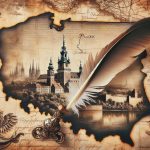
Celebrating Polish History Month in the United States gives us a chance to look at the significant contributions Polish immigrants and their children have made to the country. Polish-Americans have been crucial in many areas, including the Revolutionary War, science, arts, and politics, helping shape what America is today.
Yet, not everyone knows about Polish History Month or the traditions that come with it. Learning more about these can help us appreciate the impact of Polish-Americans and give us a fuller picture of America’s diverse culture.
The Origins of Polish History Month
Polish History Month in America started because the Polish-American community wanted to share and celebrate Poland’s rich cultural history and significant contributions. They saw the need for a special time each year dedicated to learning about Poland’s role in world history and the impact of Polish immigrants on American society. Through educational events, cultural celebrations, and discussions, Polish History Month aims to increase awareness of Poland’s history and its ongoing influence, connecting different communities in the process.
For example, during Polish History Month, schools might organize presentations about famous Polish scientists like Marie Curie, highlighting her groundbreaking work in physics and chemistry. Community centers could host Polish folk music and dance nights, offering a glimpse into Poland’s vibrant traditions. Libraries might set up exhibits featuring books by Polish authors or about Poland’s history, encouraging people to learn more. These concrete activities help bring Poland’s history to life, making it more relatable and engaging for everyone.
This month is not just about looking back; it’s also about building bridges between the Polish-American community and other Americans. By sharing stories of Poland’s past and present, Polish History Month fosters a deeper understanding and appreciation among people from different backgrounds. It’s a time to celebrate the contributions of Polish immigrants to the U.S., from scientists and artists to entrepreneurs, and to recognize the rich cultural heritage they bring.
Key Figures in Polish-American History
Polish-Americans have significantly contributed to various fields, leaving a lasting impact on both Poland and the United States. For example, in the realm of science, Marie Curie stands out. Born in Poland, she made groundbreaking discoveries that have influenced scientific research worldwide, including in America. Her work on radioactivity, for instance, not only won her two Nobel Prizes but also laid the foundation for medical treatments and research techniques that are still in use today.
In the political arena, Zbigniew Brzezinski’s role cannot be overstated. As the National Security Advisor for the United States, his strategic insights helped shape U.S. foreign policy during critical moments. His contributions were pivotal during the Cold War, where his understanding of global politics influenced decisions that affected the course of history.
Turning to the arts, Stanisław Lem is a name that resonates deeply. Though primarily known in his native Poland, Lem’s writings have had a considerable influence on American science fiction. His thought-provoking novels and stories, which often explore themes of human nature, technology, and the universe, have not only entertained readers but have also sparked discussions about philosophical and ethical issues in the context of advancing technology.
These individuals exemplify the diverse ways in which Polish-Americans have enriched both American and global culture and progress. Their achievements not only highlight the interwoven narratives of Polish and American history but also serve as a testament to the power of cross-cultural contributions. Through their work in science, politics, and the arts, they’ve provided us with valuable insights, innovations, and inspirations that continue to influence our world today.
Traditional Polish Celebrations
Polish-American communities actively celebrate their heritage with various traditional events that have deep roots in Poland’s history and culture. These celebrations are more than just gatherings; they’re a way for Polish-Americans to connect with their roots and share their rich cultural identity with future generations.
One of the most cherished traditions is Wigilia, the Christmas Eve supper. This meal is a family-centered event that features a spread of meatless dishes, symbolizing the anticipation of Christ’s birth. It’s a time for sharing stories, breaking the opłatek (Christmas wafer), and reflecting on the year gone by. Wigilia is not just a dinner; it’s an embodiment of family unity and the spirit of giving.
Easter also holds significant importance, with customs like Święconka taking center stage. On Holy Saturday, Polish families prepare baskets filled with eggs, bread, salt, and other symbolic foods to be blessed at church. This ritual is not only a religious observance but also a celebration of spring and renewal. The colorful pisanki (decorated eggs) and shared meals during Easter Sunday reinforce familial bonds and the joy of life.
Beyond the religious festivities, Polish-Americans commemorate May 3rd Constitution Day with pride. This day marks the adoption of the 1791 Constitution, a milestone in Poland’s quest for democracy and independence. Celebrations often include parades, cultural exhibitions, and community gatherings, serving as a reminder of Poland’s enduring spirit and the values of freedom and solidarity.
These traditional Polish celebrations are invaluable for keeping the community’s cultural flame alive. They educate the younger generation about their heritage, ensuring that these customs continue to thrive far from their homeland. Moreover, these occasions foster a sense of belonging and unity among Polish-Americans, bridging the gap between the past and the present.
In essence, these celebrations are a lifeline that connects Polish-Americans to their ancestral roots. They serve as a vivid reminder of where they come from and the values that define them. By participating in these traditions, the community not only honors its heritage but also ensures its legacy for generations to come.
Polish Contributions to American Society
Polish immigrants and their descendants have significantly contributed to various aspects of American society, including science, the arts, and politics. In the realm of science, Marie Curie, a Nobel Prize winner, revolutionized the way we understand radioactivity, paving the way for medical advancements and groundbreaking work in physics. Her research has been critical in developing treatments for cancer and in enhancing our knowledge of atomic science.
In the arts, Polish-Americans have profoundly impacted American culture, showcasing their talents in music, literature, and film. An example of this is the work of Czesław Miłosz, a poet whose insightful writings earned him a Pulitzer Prize, highlighting the depth and versatility of Polish contributions to American literature.
Politically, the impact of Polish-Americans is equally noteworthy. From their involvement in the Revolutionary War to their engagement in contemporary political issues, they have consistently advocated for democratic values and freedom. This political activism underscores the community’s commitment to shaping a just and equitable society.
Let’s talk about how these contributions have woven a complex and vibrant pattern into the American cultural and societal landscape. For instance, Marie Curie’s work is not just a chapter in a science textbook; it is a cornerstone of modern medicine and physics. Her discoveries have led to innovations in cancer treatment and have opened new doors in scientific research.
Similarly, the literary and artistic achievements of Polish-Americans, such as the works of Czesław Miłosz, enrich the American cultural scene, offering perspectives that bridge cultures and deepen our understanding of the human experience. These contributions reflect a blend of Polish heritage and American values, illustrating the dynamic exchange between the two cultures.
In politics, the active participation of Polish-Americans showcases their dedication to democracy and freedom. Their involvement in historical and contemporary political movements highlights their influence in shaping the nation’s policies and values, emphasizing the importance of civic engagement and advocacy.
How to Participate in Polish History Month
Celebrating Polish History Month is a fantastic way to appreciate the vital role Polish immigrants and their descendants have played in shaping American society. This month-long celebration enables us to explore the shared history of Poland and the United States more deeply. To get involved, consider attending educational talks and exhibitions at local cultural centers. These events often focus on important historical moments and influential figures, offering fresh insights into the Polish-American narrative.
Diving into Polish literature and films is another great way to connect with Polish culture. For instance, reading books by authors like Adam Mickiewicz or watching films directed by Andrzej Wajda can open up new perspectives on Poland’s rich history and traditions. Additionally, supporting Polish-American businesses and dining at Polish restaurants this month not only helps the local economy but also allows for a direct experience of Poland’s delicious cuisine and vibrant culture.
Community events, from parades to traditional folk music concerts, are particularly engaging during Polish History Month. These gatherings are not just fun; they’re also a lively showcase of Polish culture. By participating, you’re not only celebrating Polish heritage but also contributing to the rich tapestry of American diversity.
Conclusion
Polish History Month is an important time to recognize and celebrate the contributions and culture of Polish people and their descendants in the U.S. It’s a chance to learn about the significant roles they’ve played in shaping America.
By taking part in Polish History Month events, we can better understand and appreciate their traditions and achievements. This month helps bring people from different backgrounds together, making our community stronger and more connected.






Comments are closed.